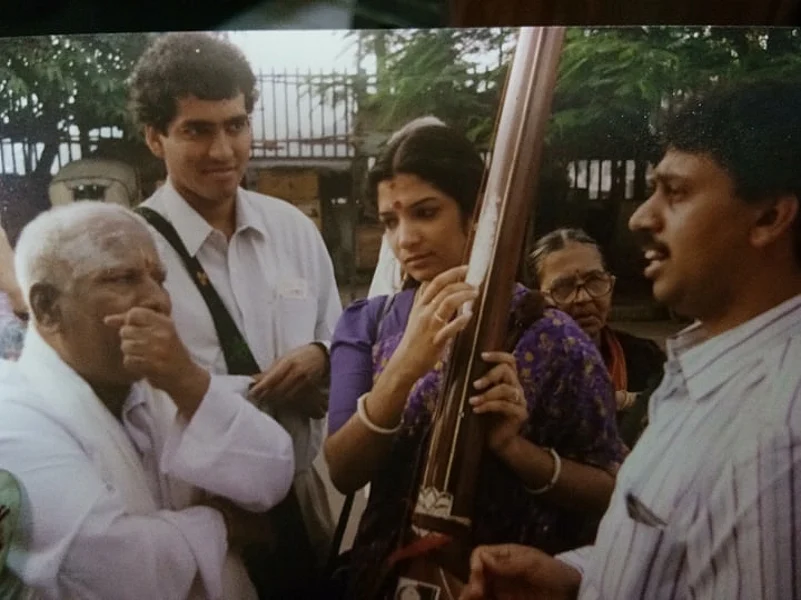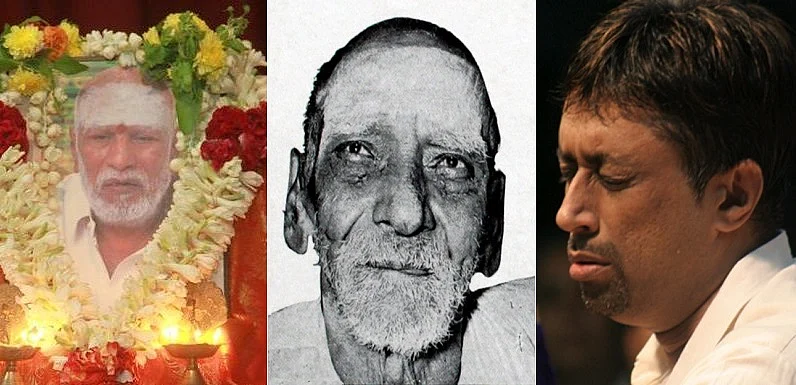It is not exactly for personal reasons that Carnatic exponent Sanjay Subrahmanyan is overwhelmed when he recalls a 2008 concert of his in Delhi, where a kriti he rendered in Suddha Dhanyasi earned the vocalist special appreciation.
For, an old-timer came to him and thanked the musician, saying the last time he heard anybody sing the composition was in the 1960s around Kapalaeesarar kovil.
Well, that is the name of a vintage temple in Chennai, where Sanjay lives. It is in that south
Indian metro that a Margazhi-time bhajanai saw the Suddhananda Bharathi (1897-1990)
song rendered when the devotional event was conducted by veteran Papanasam Sivan.
The famed composer-musician had, among others, a prominent disciple those days, about which Sanjay turns the reader’s attention in a write-up in his blog.
It is about Sethalapathi Balasubramaniam. The musician who inspired Sanjay in his impressionable teens, was a hero in Chennai’s classical music circles, though not much celebrated widely in Tamil Nadu, leave alone the rest of the peninsula.
As for Brindavanamiduvo, the composition that impressed the veteran buff in the Delhi gathering, Sanjay himself came across it a couple of decades before the incident. It was, again, at the same bhajanai group (though Papanasam Sivan had died in 1973 at age 83), during the Tamil month of Margazhi that the kriti first caught his fancy. “Sethalapathi Balu sang an unbelievable Oorilen kaani illai viruttam in Suddha Dhanyasi followed by this song,” he trails off. “I loved it so much that I got a recording and learnt it up immediately.”
Today, barely two months short of turning 50, Sanjay is a big Carnatic star. The vocalist,
known for his eclecticism, has obviously internalised—and least imitated—quite a few
legends in his field.
That definitely includes Balu Mama, yet that late musician from Sethalapathi in the Cauvery belt continues to be remembered more as an off-beat character in the circuit. The vocalist, who had his house in Chennai’s Mambalam, died in October 2004, at the age of 67, leaving fond memories for a few artistes and aficionados in what can be called inner Carnatic circles. Almost inexplicably, the man largely remained obscure despite his huge potential to gain a big name in south Indian classical music.
“His bhavam (raga expression) literally make us cry,” notes vocalist G. Baby Sreeram.
“Especially emotional are his virutham,” she adds, referring to the devotional verses sung as prelude to rhythm-set compositions. “If Balu mama never sang for money, it was not because he (teaching mathematics in school) was rich, but because music was his passion,” adds Dr Baby, originally from the Kerala capital of Thiruvananthapuram. “He was really a large-hearted man with a childlike innocence all his life.”

Not surprising, thus, that talented school students have benefited from Sethalapathi’s advice. Music buff Vishnu Ramprasad recalls his younger days in a school in Chennai’s T. Nagar.
There, on hearing him sing a song, a middle-aged master came to the boy and gave him tips on correct diction. The man, on finding that the student had learned the song Thookiya Thiruvadi from a tape of 20th-century vocalist Madurai Mani Iyer, patted him on his back. He introduced himself as a direct disciple of Sivan and said he was a secondary-grade teacher in the same school. “I fell at his feet immediately,” Vishnu recalls in an interactive portal discussing Sethalapathi, who was also inspired by iconic musician G.N. Balasubramaniam (1910-65). “I went to his house the same evening. He fed me evening tiffin and wanted me to sing some more songs.”
Vishnu, in his anecdotal note, says it was the start of a long relation during which he not only
listened music records along with Balu Mama, but even accompanied him on concerts later.
“Mama looked so simple that you could hardly believe that he possessed such a great talent,” adds the youth from a family close to Mani Iyer, whose style of rendition, too, Sethalapathi had imbibed with devotion. “My mother also had the privilege of learning many thevarams and thiruppgazhs from Balu Mama.”
In fact, Dr Baby herself did learn under Sethalapathi, so did S.P. Ramh, another young musician those days.
Sampradaya bhajana vidwan Udayalur Kalyanaraman “used to be a frequent visitor” to the house of Balu Mama, who also taught Sivan compositions to renowned musicians like Neyveli Santhanagopalan and Sudha Raghunathan, adds Vishnu.
Sethalapathi’s contemporary maestros like violinist Lalgudi Jayaraman, and vocalists Voletti
Venkateswarulu and K.V. Narayanaswamy admired his renditions. Sethalapthi’s two sons, V.
Ganapathiraman and Sivaraman, play the mridangam.
Some of the music Sethalapathi had tuned has spread abroad as well. Here is a Devi Navaratnamalika sung by Keerthana and Kriti Bhat of Swaralyam Arts Forum in America’s
Houston:
Back to Sanjay, who calls Balu Mama his ‘manasa guru’, the new-age vocalist remembers how he began attending the Margazhi-time Sivan bhajanai on the streets around the Kapali temple in the mid-1980s.
“Day in and day out, my parents and I would get up 5.30 and go to listen to the bhajanai sessions. Balu mama was a cult figure then. There was a group of about 15-20 people who simply loved his singing and we joined that loyal band of fanatics.”
Expressing adulation for the way Balu Mama articulated the lyrics with a torrent of sangatis, Sanjay adds, “I will never forget how he came to my wedding and blessed us with a spontaneous virutham! What more can one ask for?”
















